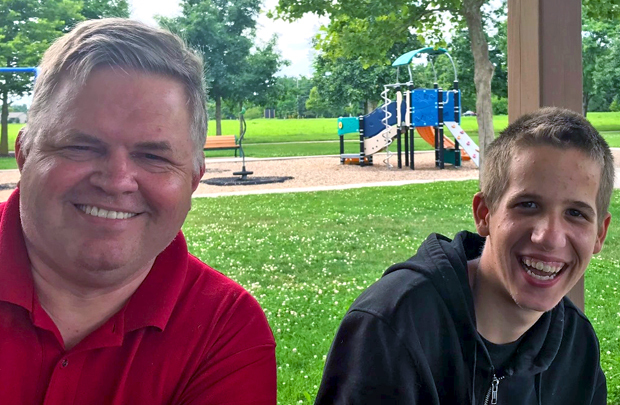
Andrew Sporner paced the floor in his Michigan home in 2021. “I am a single, unmarried man in my 50s, and what business do I have doing this?” he thought.
Andrew, a computer software engineer, was considering adopting Alex, a teenager in foster care who was about to turn 18 and “age out” of the foster care system. Andrew had seen Alex on a viral segment of Indiana’s WNDU Wednesday’s Child television program. As he approached his 18th birthday, Alex prayed that he would be adopted.
When teenagers reach the age of 18, they typically “age out” of the system and may struggle to have the security and safety net of a home, relationships, and other assets.
They may also lose important personal relationships. For some, this can mean being at higher risk for adverse adult outcomes. For example, it may be harder to find employment, and people may experience homelessness.
Youth who age out of foster care find ways to be self-sufficient. While there are resources—including medical insurance, mentoring, and career training—these teens’ lives are significantly changed. All of these facts were rolling around in Andrew’s mind as he wrestled with the idea of becoming a dad.
Andrew continued to think about adopting and found comfort in prayer.
“I prayed on it at church and talked to my men’s discipleship group. And they said, ‘Well if you feel like you have to pray over it, see what happens.’ The urge got stronger,” Andrew said.
“I thought the whole idea was pretty much preposterous,” Andrew admitted. “My age. Being single. I live in the Midwest. In larger metropolitan areas, it’s common, I think, for single people to adopt, but not in the Midwest area. And I had some reservations, and wondered whether people would think it is an acceptable thing.”
Actually, Andrew, as a single person, was more than qualified to adopt in Indiana and the US.
Some youth in foster care even prefer having a single parent of the same sex. Placements often are based on the individual’s needs and how they match up with the dynamics of families, individual racial and gender backgrounds, personalities, and living circumstances of the potential adoptive parent.
To qualify to be a parent, Andrew had to take online training courses and learn about important topics.
To help prepare him for the parental role and responsibilities, he learned about setting boundaries. Classes also covered the trauma children in foster care often carry and how those life changes could affect Alex.
“It was basically a bunch of exercises. I learned that you have to go into the adoption process with an open mind, that you can’t put the same expectations you have for yourself onto somebody else.”
Andrew continued by saying, “I had to learn about the trauma of having attachments and what it is to lose those attachments. One great exercise was putting everything on paper that we both like. We listed things like church, choir practice, men’s group, and our love for computers.”
We asked Andrew what it has been like since the adoption was finalized earlier this year. He chuckles at the thought.
“It’s kind of like having a college roommate all over again, with a huge age gap. We work on projects together and he has chores that he has to do. When I first met him, we clicked and I saw so much of myself in Alex.”
Andrew has learned an important lesson: “It’s really about being patient. You have to be willing to give more than you’re expecting to get back.”
And, Andrew laughs when he thinks about an upcoming test of his patience. Alex is learning how to drive later this summer.